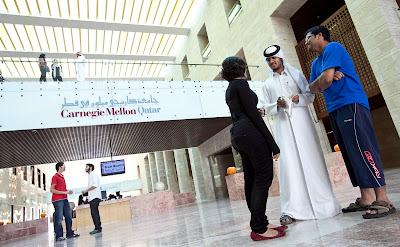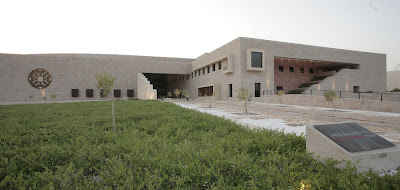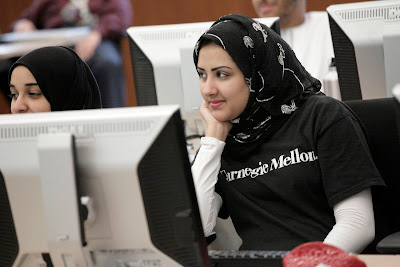As our Wandering Educators know, we love to share international education opportunities around the world. With more than a century of academic excellence and innovative research, Carnegie Mellon University is a leader in education with real-world applications. Continuously top ranked and respected worldwide, Carnegie Mellon offers a distinct mix of programs to its 10,000 students at campuses around the globe. I am so pleased today to share an interview about Carnegie Mellon Qatar. We were lucky enough to speak with Andrea Zrimsek, Publications Manager at Carnegie Mellon Qatar, about the Qatar campus, academic programs, intercultural challenges, and more. Here's what she had to say...

WE: Please tell us about Carnegie Mellon in Qatar...
AZ: With more than a century of academic excellence and distinguished research, Carnegie Mellon University is a leader in education with real-world applications. Consistently top ranked, the University has more than 11,000 students, 72,000 alumni and 4,000 faculty and staff globally. Core values of innovation, creativity, collaboration and problem solving provide the foundation for everything we do.
Carnegie Mellon University in Qatar is a key component of Carnegie Mellon’s continuing mission to provide students around the world with the highest level of knowledge and preparedness for a changing world. Our standards of academic excellence are upheld globally. Students in Pittsburgh, Doha, Adelaide and all of our international campuses adhere to the same curriculum and academic rigor.
WE: What was the impetus to open a Carnegie Mellon campus in Qatar?
AZ: At the invitation of Qatar Foundation, Carnegie Mellon joined Education City in 2004. Here, Qatar Foundation created a unique center for scholarship and research that is the ideal complement to Carnegie Mellon’s mission and vision. QF hand picked each university to offer a few of its top programs.
Also, as a global university Carnegie Mellon knows it can no longer only offer education in Pittsburgh, it has to have a more global footprint to make a more global impact.

WE: Who are your faculty on the ground there - and students?
AZ: Students from Qatar and 33 different countries enroll at our world-class facilities in Education City. Though they represent many nationalities, a lot of our students are born and raised here (being born in Qatar does not give you citizenship like in the US. You receive the citizenship of your father. We are, however, seeing an increase in students who come to Qatar for the sole purpose to go to Carnegie Mellon).
Our faculty and staff are also diverse. Our faculty is made up of professors from our home campus in Pittsburgh and faculty selected from other top universities around the world. A lot of our faculty have a split appointment, meaning they spend one semester in Doha and one in Pittsburgh. This helps ensure our academics are on track and also keeps a close tie with our home campus.
WE: What academic programs do you offer the students?
AZ: Carnegie Mellon Qatar offers undergraduate programs in business administration, computer science and information systems, as well as executive and corporate education.
This year we have 136 students in Business Administration; 65 in Computer Science; and 45 in Information Systems.
We also have 44 people enrolled in our Corporate Innovation and Entrepreneurship Program, which is for working professionals.

WE: What intercultural challenges has Carnegie Mellon in Qatar faced?
AZ: I don’t know that we’ve had any unusual cultural challenges. We knew from the beginning that we would have to adapt to our host country’s culture. Fortunately Carnegie Mellon believes in the open sharing of ideas, so we encourage open dialogue about all issues. Our dean always says that we learn as much as we teach. And that is true. Qatar is in a period of rapid growth and change, and education is a key component of it.
WE: How is campus life structured at Carnegie Mellon in Qatar? Are there residence halls, clubs, study groups, etc?
AZ: Most of our students live at home with their parents. The idea of living on your own is not done regularly in this culture. Most children typically stay at home until they marry. We do have dorms on campus, but most of the students who live there are not residents of Qatar. We are seeing more upperclassmen move into the dorms. Keep in mind Education City is pretty new, as is western higher education. So change takes time.
WE: Is there anything else you'd like to share with us?
AZ: I guess I would want your readers to know that we are not here to ‘Americanize’ the Arab world. Top universities from all over the world are setting up campuses in the Middle East. Qatar Foundation wants to have the top programs in Doha. And to date they are all offered from American universities. But European institutions are being considered.
This part of the world is growing and changing so rapidly and education really is a key component. Until Education City was established, there was only Qatar University, which I would (in my own opinion) equate to a community college. For bright young people to get a Tier 1 education they had to go to Europe or America. Which, for women, is not always allowed. Yet another reason universities are going global. In the six years we have been here, we have made such a positive impact on the lives of our students. It’s really incredible.
WE: Thanks so much, Andy!
For more information, please see:
www.qatar.cmu.edu

All photos courtesy and copyright Carnegie Mellon University in Qatar.
